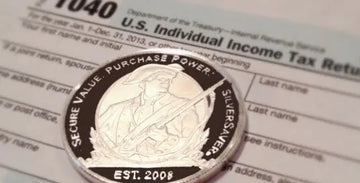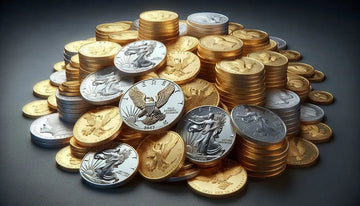Buying and selling coins and bullion can be an exciting venture, but it's essential to understand the tax implications involved. The tax treatment of these transactions varies depending on factors such as the jurisdiction, the nature of the transaction, and your specific circumstances. In this comprehensive guide, we'll explore the tax considerations associated with buying and selling coins and bullion, including exemptions, reporting requirements, and important considerations. By staying informed about the tax landscape, you can make informed decisions and maximize your financial gains when participating in the coin and bullion market.
Sales Tax:
- Exemptions for Bullion: In many jurisdictions, purchases of investment-grade bullion, such as gold, silver, platinum, and palladium, are exempt from sales tax. However, it's important to research and understand the specific regulations in your jurisdiction, as exemptions may vary.
- Sales Tax on Numismatic Coins: Sales tax treatment for numismatic coins, which hold collectible value beyond their metal content, can vary. Some jurisdictions apply sales tax to numismatic coins, while others may exempt them. Research local tax laws to determine the applicable sales tax rates and exemptions.
Capital Gains Tax:
- Long-Term vs. Short-Term Capital Gains: When you sell coins or bullion at a profit, it may be subject to capital gains tax. The tax rate will depend on whether the gain is considered long-term (held for more than one year) or short-term (held for one year or less). Long-term gains generally benefit from lower tax rates.
- Reporting Capital Gains: It's crucial to keep detailed records of your purchases and sales, including the acquisition cost, sale price, and any related expenses. Proper record-keeping will facilitate accurate reporting of capital gains and ensure compliance with tax regulations.
- Precious Metals IRAs: Utilizing a Precious Metals Individual Retirement Account (IRA) can offer potential tax advantages when buying and selling precious metals. Consult with a financial advisor or tax professional to understand the specific rules and benefits associated with Precious Metals IRAs.
Reporting Requirements:
- Form 1099-B: In the United States, if you engage in certain coin and bullion transactions exceeding specific thresholds, the seller is required to file Form 1099-B with the Internal Revenue Service (IRS) and provide a copy to the buyer. Consult IRS guidelines or seek professional advice to determine the reporting requirements that apply to your transactions.
- International Reporting: If you're involved in cross-border transactions or if you reside outside the United States, it's crucial to understand and comply with the tax reporting requirements of your respective jurisdiction. Consult with a tax professional or research the specific regulations applicable to your situation.
Considerations and Expert Advice:
- Tax Professional Guidance: Due to the complexities of tax regulations, seeking guidance from a tax professional who specializes in investment assets, such as coins and bullion, is highly recommended. They can provide tailored advice based on your specific circumstances and help optimize your tax strategy.
- Cost Basis and FIFO: Understanding the concept of cost basis (the original purchase price) and the "First-In, First-Out" (FIFO) method of determining which coins or bullion are sold first is important for accurate reporting. Discuss with a tax professional to ensure proper calculations and minimize potential errors.
- State and Local Taxes: While this guide provides a general.





